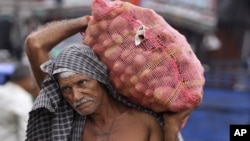NEW DELHI — Economic growth in India has slipped to a three-year low, confirming a sharp slowdown in Asia’s economy.
The 5.5 percent economic growth from April to June was slightly higher than in the previous three months. But it brought no cheer to a country where the economy has stalled in recent months.
Virtually all sectors such as manufacturing, services and agriculture posted slower growth compared to the same period last year, said Dharmakirti Joshi, chief economist at ratings agency CRISIL in Mumbai.
“The investment growth is close to zero, the private consumption has slowed down materially and if you look at exports, the external demand, that also is beginning to slow down,” Joshi said.
While India has been affected by the global slowdown, economists say domestic factors are largely responsible for the plummeting growth.
They say one of the main worries centers around persistently high inflation and high interest rates, which have hit consumption -- the main driver of India’s growth.
Another key concern is that economic reforms continue to be stalled due to a political impasse. The government, embroiled in a number of corruption scandals, has been on a collision course with opposition parties. As a result, key legislation, which could revive the economy, is stuck in a deadlocked parliament.
The policy paralysis has unnerved investors. In recent months, a number of domestic and foreign businesses have put investment plans on hold. The government admits restoring investor confidence could be key in determining how the economy fares.
The Deputy Chairman of India’s Planning Commission, Montek Singh Ahluwalia, is optimistic and hopes for a rebound in coming months.
“A lot will depend really on what happens to the level of investment, both public sector investment and of course private investment," he said. "I think it is most likely in the second half of the year that investment intentions will begin to change.”
Taking note of the sagging economy, Prime Minister Manmohan Singh appointed a new finance minister a month ago, and there are hopes that he will take steps to address concerns of investors.
The government estimates that the economy will grow by 6.8 percent this fiscal year. But most analysts project much lower growth of around 5.5 percent.
That is a huge disappointment for a country which just a year ago, was hoping to hit double digit growth, and which has been widely described as an engine to revive the global economy.
The 5.5 percent economic growth from April to June was slightly higher than in the previous three months. But it brought no cheer to a country where the economy has stalled in recent months.
Virtually all sectors such as manufacturing, services and agriculture posted slower growth compared to the same period last year, said Dharmakirti Joshi, chief economist at ratings agency CRISIL in Mumbai.
“The investment growth is close to zero, the private consumption has slowed down materially and if you look at exports, the external demand, that also is beginning to slow down,” Joshi said.
While India has been affected by the global slowdown, economists say domestic factors are largely responsible for the plummeting growth.
They say one of the main worries centers around persistently high inflation and high interest rates, which have hit consumption -- the main driver of India’s growth.
Another key concern is that economic reforms continue to be stalled due to a political impasse. The government, embroiled in a number of corruption scandals, has been on a collision course with opposition parties. As a result, key legislation, which could revive the economy, is stuck in a deadlocked parliament.
The policy paralysis has unnerved investors. In recent months, a number of domestic and foreign businesses have put investment plans on hold. The government admits restoring investor confidence could be key in determining how the economy fares.
The Deputy Chairman of India’s Planning Commission, Montek Singh Ahluwalia, is optimistic and hopes for a rebound in coming months.
“A lot will depend really on what happens to the level of investment, both public sector investment and of course private investment," he said. "I think it is most likely in the second half of the year that investment intentions will begin to change.”
Taking note of the sagging economy, Prime Minister Manmohan Singh appointed a new finance minister a month ago, and there are hopes that he will take steps to address concerns of investors.
The government estimates that the economy will grow by 6.8 percent this fiscal year. But most analysts project much lower growth of around 5.5 percent.
That is a huge disappointment for a country which just a year ago, was hoping to hit double digit growth, and which has been widely described as an engine to revive the global economy.




